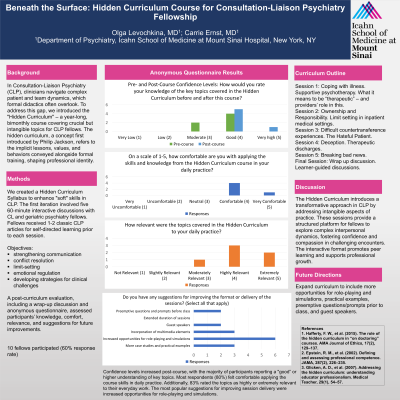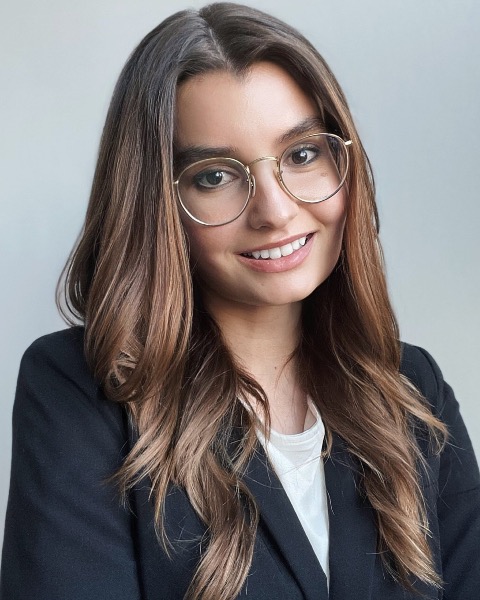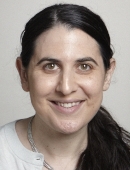Training, Education, Mentorship, and Career Development
(193) Beneath the Surface: Hidden Curriculum Course for Consultation-Liaison Psychiatry Fellowship.


Olga Levochkina, MD
Assistant Professor
Icahn School of Medicine at Mount Sinai
New York City, New York
Carrie L. Ernst, MD, FACLP
Associate Professor
Icahn School of Medicine at Mount Sinai
New Rochelle, New York
Presenting Author(s)
Co-Author(s)
Background/Significance:
In Consultation-Liaison Psychiatry (CLP) training, clinicians navigate delicate patient and team interactions daily. Formal didactic curriculum overlooks these nuances, leaving gaps in practical skill acquisition. Recognizing this, we introduce the "Hidden Curriculum" – a bimonthly year-long course addressing intangible yet crucial topics for CLP fellows' professional development, focusing on skills and attitudes influencing their identity as physicians. The concept of hidden curriculum was first introduced by Philip Jackson and means the unintended or implicit lessons, values, and behaviors that are conveyed to learners in addition to the formal curriculum.
Methods:
We developed a Hidden Curriculum Syllabus to address fellows' training needs, focusing on "soft" skills in CLP. For the first iteration of the course, we conducted 5 interactive 60-minute discussions with CL and geriatric psychiatry fellows throughout the academic year. One to two classic articles in CLP for self-directed learning were sent out to the fellows a few days prior to each session. Topics covered included supportive psychotherapy at bedside, challenging countertransference experiences, ownership and limit setting, breaking bad news, and therapeutic discharges. The learning objectives were to enhance fellows' communication and conflict management skills, increase comfort with limit setting and negotiation, foster "thinking dirty" abilities, develop strategies to regulate emotional responses, and provide opportunities to develop scripts for navigating clinical challenges.
Evaluation plan:
After completing the year-long curriculum, we will conduct a post-intervention evaluation, including a wrap-up session with learner-guided discussions and an anonymous questionnaire assessing participants' perceived knowledge, comfort levels, session quality, relevance to practice, suggestions for future sessions, and any additional comments.
In the 2024-2025 academic year, curricular evaluation will be conducted using pre- and post-session surveys. Learners will be asked to rate their confidence on a 1-5 Likert scale in their ability to navigate various hidden curriculum topics in real life. After completing each session, fellows will be asked once again to rate their confidence and to leave reflective comments.
Results:
We aim to complete the first year of implementing these educational didactics and gather structured feedback from fellows to refine the depth and breadth of hidden curricula in psychiatry. Data collection and analysis is expected to be complete by the end of this academic year.
Discussion:
The Hidden Curriculum represents a transformative approach in CLP education by addressing the often-overlooked intangible aspects of practice. The sessions provide a structured platform for exploring complex interpersonal dynamics, empowering fellows to navigate challenging encounters confidently and compassionately. Interactive discussions foster peer learning, creating a supportive environment for professional growth.
Conclusions/Implications:
Integration of the Hidden Curriculum into CLP fellowship programs holds significant promise for enhancing education quality. Its continuous evaluation and refinement are essential for ensuring effectiveness and relevance.
References
1. Hafferty, F. W., et al. (2015). The role of the hidden curriculum in “on doctoring” courses. AMA Journal of Ethics, 17(2), 129–137.
2. Epstein, R. M., et al. (2002). Defining and assessing professional competence. JAMA, 287(2), 226–235.
3. Glicken, A. D., et al. (2007). Addressing the hidden curriculum: understanding educator professionalism. Medical Teacher, 29(1), 54–57.
Presentation Eligibility: Not previously published or presented
Diversity, Equity, and Inclusion: This submission describes a new didactic course for the Consultation-Liaison Psychiatry Fellowship that addresses the hidden curriculum. By acknowledging nuances in patient interactions and team dynamics, the course fosters inclusivity; by exploring topics like conflict management and understanding hidden motivations, it addresses inequities in care for historically marginalized groups, promoting equitable healthcare practices. The goal is to equip participants with the skills to navigate these complexities sensitively and effectively.

